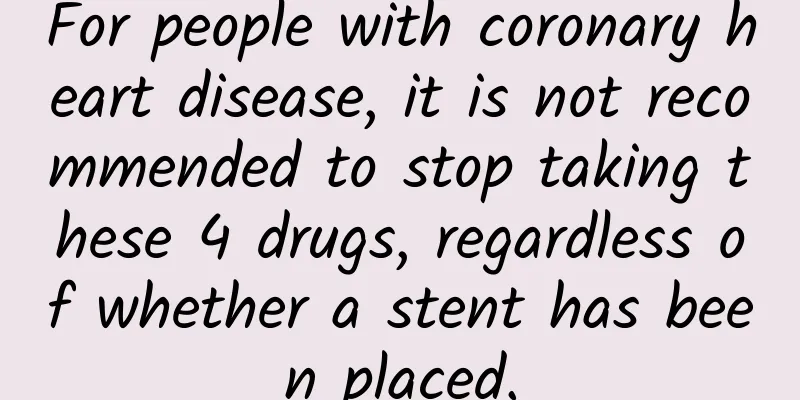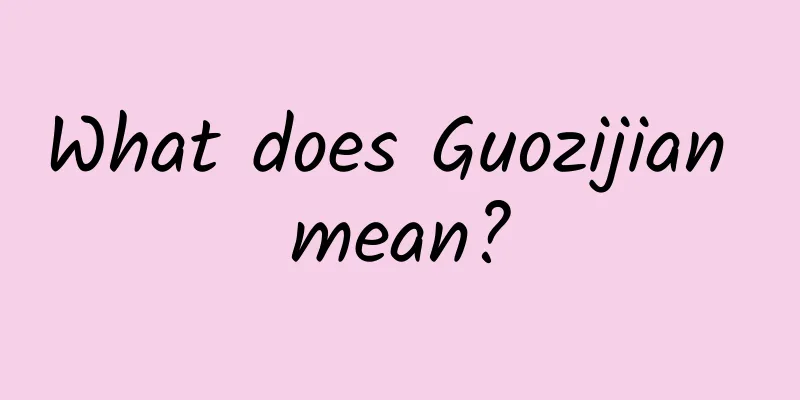For people with coronary heart disease, it is not recommended to stop taking these 4 drugs, regardless of whether a stent has been placed.

|
A patient with coronary heart disease told Huazi that after he had a stent operation, his angina symptoms were basically gone. He felt that he was taking too many medicines and wondered if he could reduce them. Huazi checked his treatment plan and told him that there were 4 drugs that he could not stop taking, regardless of whether he had a stent operation. Coronary heart disease requires lifelong medication to control the condition. Even if a stent is placed, it will only relieve the most serious blood vessel, and other blood vessels are in danger, so key medications cannot be stopped. 1. Coronary artery atherosclerosis Coronary heart disease is the full name of coronary artery atherosclerosis. It refers to the atherosclerosis of the coronary arteries that supply blood to the heart. The proliferation of plaques causes coronary artery stenosis. When the degree of stenosis exceeds 50%, it will be diagnosed as "coronary heart disease". The narrowed coronary artery blocks blood flow. When the heart does not get enough blood supply, angina pectoris symptoms such as tightness and chest pain will appear. However, angina pectoris is not the biggest threat faced by patients with coronary heart disease. The main danger of coronary heart disease lies in the possibility that atherosclerotic plaques in the coronary arteries may rupture, inducing platelet aggregation and thrombus formation, which will lead to myocardial infarction and sudden death of the patient. 2. Four key drugs for treating coronary heart disease 1. Statins: The cause of coronary heart disease is atherosclerosis of the coronary arteries and the appearance of hardened plaques. Statins have been proven to effectively reverse plaques, reduce their size, and strengthen them, making them less likely to rupture. In the treatment of coronary heart disease, statins are the "cornerstone" drugs and should be taken all the time as long as there are no contraindications. 2. Antiplatelet drugs: When plaques in the coronary arteries rupture, platelets aggregate to form thrombi, which is the main cause of myocardial infarction. If a stent is placed in the coronary artery, it may also stimulate platelet aggregation. Therefore, antiplatelet drugs such as aspirin, clopidogrel, and ticagrelor are key drugs for the treatment of coronary heart disease. They can prevent the occurrence of myocardial infarction and should not be discontinued at will. 3. Drugs to control heart rate: metoprolol, bisoprolol and other olol drugs; diltiazem, verapamil and other calcium channel blockers; and ivabradine, which can inhibit the electrical signal of the heart's sinoatrial node, are all commonly used drugs to inhibit heart rate. These drugs can slow down the heart rate, reduce myocardial contractility, reduce cardiac oxygen consumption, prevent the occurrence of myocardial ischemia, and reduce the incidence of cardiovascular accidents in patients with coronary heart disease. They need to be taken for a long time. 4. "Pril" or "Sartan": Pril drugs and sartan drugs are commonly used antihypertensive drugs. Both can block the effects of angiotensin 2 on the cardiovascular system, improve myocardial function, prevent ventricular remodeling, and have a good cardioprotective effect. Among them, "Pril" can also increase bradykinin levels, which has a dual protective effect on the cardiovascular system. "Pril" is usually the first choice. If the side effect of dry cough cannot be tolerated, "Sartan" can be used as an alternative. 3. Sometimes more drugs are used In addition to these four key drugs for treating coronary heart disease, more drugs may be used depending on the patient's condition. For example, if angina attacks are frequent, nitrates are needed to dilate the coronary arteries and improve blood supply. Nicorandil, which has similar effects to nitrates, dihydropyridine drugs that weaken myocardial contractility, and trimetazidine, which improves myocardial cell oxygen utilization, are all commonly used drugs for treating coronary heart disease. If you have heart failure, you will also need to use diuretics to reduce fluid retention, reduce blood volume, and reduce the heart's load. If you have diabetes, you will also need to use hypoglycemic drugs to control blood sugar. These drugs cannot be discontinued at will. To sum up, coronary heart disease requires multi-drug treatment. Even after stent surgery, the medication cannot be stopped at will. Especially the four key drugs, as long as there are no corresponding contraindications, they need to be kept in the treatment plan. Depending on the patient's specific situation and comorbidities, other medications may also need to be added. For specific medications for patients with coronary heart disease, be sure to follow the doctor's orders and take the medication under the guidance of a doctor. If you have any questions about the medication, consult a doctor or pharmacist in time, and do not stop the medication at will. I am pharmacist Huazi, welcome to follow me and share more health knowledge. |
>>: What are the benefits of mochi? What are the types of mochi?
Recommend
Which one makes you gain weight more easily, eating noodles or eating rice?
Review expert: Wang Xuejiang, Professor of Pathop...
How to pay attention to maintenance in the early stage of menopause
Menopause is a very important period for women. I...
How to treat body coldness and uterine coldness, 9 ways to help you
Women with cold body and cold uterus are prone to...
The War on Infectious Diseases - Spring: Chickenpox
This is the 2977th article of Da Yi Xiao Hu Curio...
Can vaginal ultrasound detect ectopic pregnancy?
Pregnancy is a very happy thing. Early pregnancy ...
Can pregnant women sleep on a new mattress?
The sleeping condition of pregnant women is the m...
What is the reason for bleeding just after menstruation?
Some people will have sex right after their menst...
Can a tablet be considered a computer? What does it mean to flash a tablet?
Tablet computers, also known as portable computer...
I have small itchy bumps in my vagina.
Vulvar itching is mainly caused by gynecological ...
The dangers of cosmetic preservatives, revealing the truth for you!
Nowadays, the cosmetics we consume contain some p...
How much is Huang Lei's Sprite Noodles? Where can I buy it? Is Huang Lei's Sprite Noodles delicious? How does it taste?
We all know that Huang Lei cooks all kinds of foo...
The baby was born with a deformity despite normal prenatal examination
If the prenatal check-up is normal, the baby will...
Is silicone breast augmentation safe? Women must know
With the development of medicine in recent years,...
What is the best way to treat kidney yang deficiency in women?
Do many women have such symptoms: weak waist and ...









